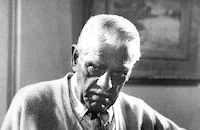Tonight or Never
Brief Synopsis
Cast & Crew
Mervyn Leroy
Gloria Swanson
Melvyn Douglas
Alison Skipworth
Ferdinand Gottschalk
Robert Greig
Film Details
Technical Specs

Synopsis
Hungarian prima donna Nella Vago sings Tosca in Venice, and while her performance is politely received, her music teacher Rudig tells her that she will never be successful until her singing is more passionate. Although Nella is infuriated by Rudig's demand that she must sing with her soul as well as with her voice, she is distracted by a mysterious man repeatedly walking in the courtyard below her balcony. Rudig intimates that the man is the gigolo of the Marchesa Bianca San Giovanni, a former diva with a notorious past. Later that night, Nella is kept awake by the passionate whispers of a honeymooning couple staying in the room next door, and she decides to return to Budapest that night. Accompanied by her butler Conrad, her maid Emma, Rudig and her stuffy fiancé, Count Albert von Gronac, Nella boards the train bound for home. Her anonymous admirer is also on the train with the marchesa, and Nella burns with jealousy. Rudig again tells Nella that she needs to experience love if she is ever to become a great singer, and she gently turns him down when he offers himself as a suitor. The next day, Rudig tells Nella that Fletcher, an agent for the prestigious Metropolitan Opera Company in New York, is signing European artists. Nella also discovers that afternoon that Albert is having an affair with another diva. Furious at his betrayal and her own colorless existence, Nella goes to the hotel where her admirer, who is named Jim, is staying. Using a flimsy excuse to get into his room, Nella vacillates between fulfilling her desires or fleeing. Jim realizes that she believes him to be a gigolo, but nonetheless confesses his love and challenges her to stay with him "tonight or never" and experience true passion. Nella gives in, but leaves the next morning before Jim awakens. That night, Nella sings Tosca again, and her emotional performance is acclaimed by the audience and by Rudig. Nella returns home from the opera house and finds a Metropolitan contract sent to her by Fletcher. She is delighted by the contract, but overcome with guilt over her actions of the night before. Jim arrives to return the emerald necklace she left in his hotel room as payment for his "services," and she tells him that she never wants to see him again. Later, however, she goes to him and asks him to give up his shameful lifestyle for her. When he in turn asks if she would give up her career for him, she gladly tears up the Metropolitan contract. Just then, the marchesa enters and reveals that she really is Jim's aunt and that he is Fletcher of the Metropolitan. Nella is overjoyed, for now she can have love and a successful career.

Director

Mervyn Leroy
Cast

Gloria Swanson

Melvyn Douglas

Alison Skipworth
Ferdinand Gottschalk
Robert Greig
Warburton Gamble
Greta Meyer

Boris Karloff
Crew
Chanel Of Paris
Giuseppe Giacosa
Samuel Goldwyn
Samuel Goldwyn
Gordon Hollingshead
Luigi Illica
Alfred Newman
Willy Pogány
Giacomo Puccini
Victorien Sardou
Gregg Toland
Ernest Vajda
Vinton Vernon
Grant Whytock

Film Details
Technical Specs

Quotes
Trivia
Notes
According to a June 6, 1931 Hollywood Filmograph news item, Adela Rogers St. Johns was to work on the screen adaptation of the play Tonight or Never, which was first produced in Hungary, and a August 19, 1931 Hollywood Reporter news item noted that Sheridan Gibney was to work on the screenplay of this film. Hollywood Filmograph and Motion Picture Herald production charts list Sidney Howard as the scenarist. The participation of these three writers, who are not listed in the film's credits or other contemporary sources, has not been confirmed. According to a Film Daily news item in January 1931, George Fitzmaurice was planning to direct the film. Tonight or Never marked the screen debut of Melvyn Douglas, who recreated the role he originally played on Broadway. According to news items, Douglas, who married his co-star in the play, Helen Gahagan, received a Hollywood contract because of his performance in the play. Ferdinand Gottschalk, Robert Greig, Greta Meyer and Warburton Gamble were also in the original Broadway play, which was theater impresario David Belasco's last production before his death. Director Mervyn LeRoy was borrowed from First National. The Variety review gave the picture's running time as 66 minutes. The film's pressbook points out that both adaptor Ernest Vadja and set designer Willy Pogany were Hungarians.
According to the MPAA/PCA Collection at the AMPAS Library, the Hays Office strongly objected to the film after it was completed and demanded several extensive cuts. The sequence most objected to was the love scene between "Nella Vago" and "Jim Fletcher," about which Hays Office staff member Lamar Trotti commented, "This scene was one of the most offensive, if not the most offensive-in my recollection." Other scenes trimmed showed the character of Nella "writhing on a day-bed in a particularly offensive manner," and her being unable to sleep because of the honeymooners in the next room. The film was finally given a seal of approval for its original release, but when United Artists tried to re-issue it in 1935, the PCA requested that the studio withdraw it from consideration "on the grounds that [it is] highly questionable and [is] likely to be rejected by us." United Artists did so, and when they tried to re-issue the film in 1937, the PCA again rejected it.

Miscellaneous Notes
Released in United States August 30, 2000
Released in United States on Video August 30, 2000
35mm
b&w
Released in United States August 30, 2000
Released in United States on Video August 30, 2000











